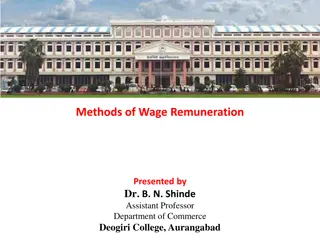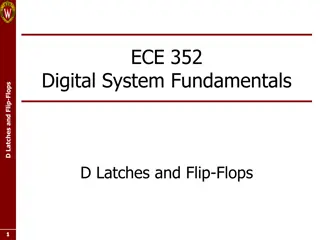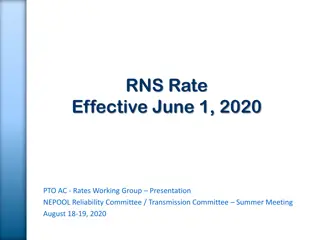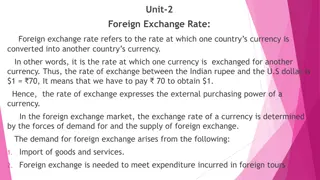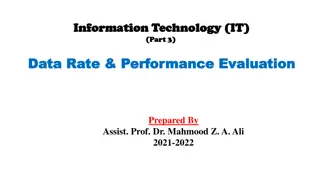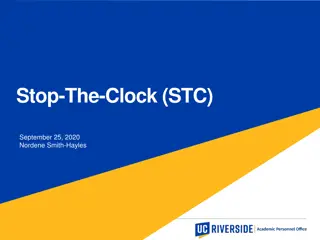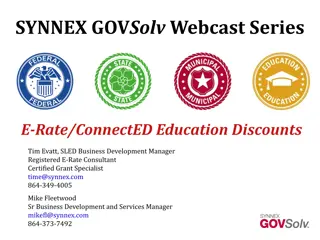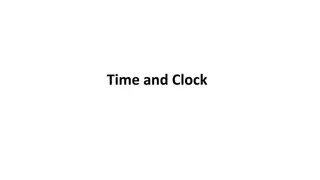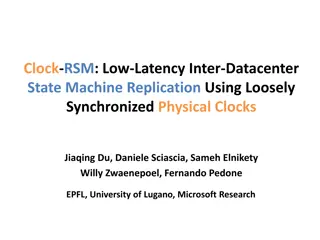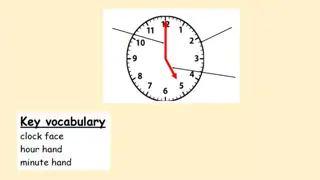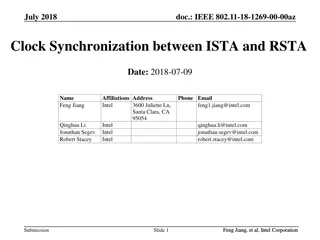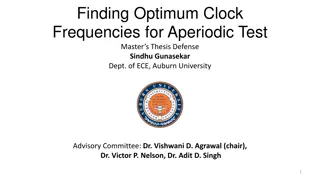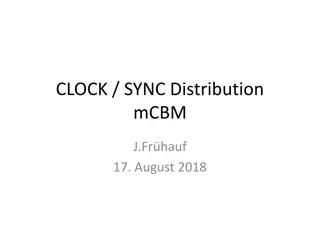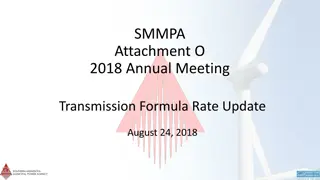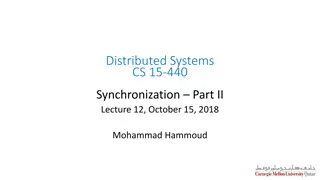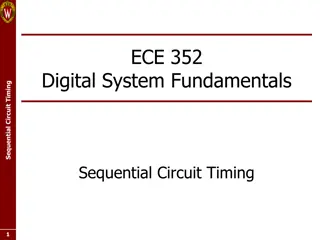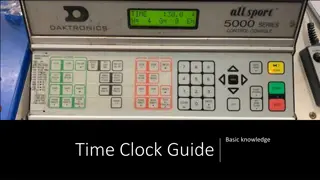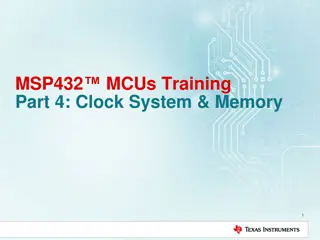Making invisible skills visible and valued
CLOCK is an international professional development framework that enables creative individuals to showcase their professional capabilities. The CLOCK Programme uncovers and recognizes invisible skills, mapping them to international professional and higher education levels.
3 views • 10 slides
Managing Interest Rate and Currency Risks: Strategies and Considerations
Interest rate and currency swaps are powerful tools for managing interest rate and foreign exchange risks. Firms face interest rate risk due to debt service obligations and holding interest-sensitive securities. Treasury management is key in balancing risk and return, with strategies based on expect
4 views • 21 slides
Clock Change Impacts on MHHS Design Artefacts for CR036
Detailed redline changes to MHHS Design Artefacts for CR036 related to the use of midnight clock time for appointments and readings. Includes updates to business process maps, data catalogue definitions, and interface catalogue revisions to align with the new requirements.
7 views • 16 slides
Improving Heat Rate Efficiency at Illinois Coal-Fired Power Plants
Heat rate improvements at coal-fired power plants in Illinois are crucial for enhancing energy conversion efficiency, reducing carbon intensity, and minimizing pollution. By increasing the heat rate/efficiency by 6%, these plants can generate more electricity while burning the same amount of coal. T
2 views • 11 slides
Wage Remuneration Methods Overview
Dr. B. N. Shinde, Assistant Professor at Deogiri College, Aurangabad, presents an insightful overview of methods of wage remuneration including Time Rate System, Piece Rate System, and Combination of Time and Piece Rate System. Time Rate System is the oldest method where workers are paid based on ti
0 views • 16 slides
Understanding D Latches and Flip-Flops in Digital Systems
Digital systems rely on storage elements like D latches and flip-flops to store key information from the past. These structures can hold values of 1 or 0 based on certain control signals, ensuring deterministic behavior. Clock signals are essential for regulating when these storage elements can upda
0 views • 15 slides
Transmission Rate Change Overview for June 1, 2020
Presentation on the Rate Change effective June 1, 2020, detailing RNS Rate adjustments, Annual Transmission Revenue Requirements, and Regional Forecasts. The RNS Rate increased to $129.26/kW-year reflecting transmission project impacts, while ATRR analysis showed changes in revenue requirements for
0 views • 25 slides
Understanding Foreign Exchange Rates and Market Forces
Foreign exchange rate is the rate at which one country's currency is converted into another's, reflecting purchasing power. The rate is determined by demand and supply in the foreign exchange market, influenced by factors like imports, exports, investments, and speculation. Equilibrium rate is reach
0 views • 42 slides
Understanding Data Rate Limits in Data Communications
Data rate limits in data communications are crucial for determining how fast data can be transmitted over a channel. Factors such as available bandwidth, signal levels, and channel quality influence data rate. Nyquist and Shannon's theoretical formulas help calculate data rate for noiseless and nois
0 views • 4 slides
Understanding Referral to Treatment (RTT) Quality Standards
Referral to Treatment (RTT) Quality Standards, also known as RTT 18 Weeks, is a vital component of the NHS Constitution that guarantees patients a legal right to timely diagnosis and treatment within 18 weeks of referral. It encompasses various stages in a healthcare pathway, each assigned an RTT co
1 views • 12 slides
Understanding Heart Rate Variations During Rest and Exercise
This experiment focuses on measuring heart rate at rest and after physical exercise, exploring the factors that influence heart rate changes. Through hands-on activities and theoretical lessons, students learn about the cardiac cycle, the circulatory system, and the impact of physical exertion on he
1 views • 22 slides
Estimation of Drying Time in Spray Drying Process: Diffusion and Falling Rate Periods
The estimation of drying time in a spray drying process involves understanding diffusion-controlled falling rate periods, constant rate periods, and the mechanisms by which moisture moves within the solid. The drying rate curves depend on factors like momentum, heat and mass transfer, physical prope
0 views • 8 slides
Understanding Counters in Sequential Circuits
Counters in sequential circuits are crucial components used for counting clock cycles and measuring time intervals. They are composed of flip-flops that progress through a sequence of states based on clock pulses. This sequential circuit has no inputs other than the clock pulse and relies on its int
1 views • 22 slides
Empirical Analysis of Kuwaiti Dinar Exchange Rate Behavior and Misalignment
This research focuses on studying the behavior of the real equilibrium exchange rate (REER) of Kuwaiti Dinars, estimating the equilibrium exchange rate using the BEER model, and calculating real exchange misalignments (RERM). It delves into the impact of exchange rate fluctuations on macroeconomic v
0 views • 15 slides
Understanding Sequential Counters in Digital Circuits
Sequential counters, comprised of flip-flops, are essential in digital circuits for counting clock cycles. They advance through states based on clock pulses and can measure time intervals. The circuit's output state solely depends on its present state, with transitions occurring at each clock pulse.
0 views • 22 slides
The Enigmatic Clock Tower
In a captivating narrative inspired by The Clock Tower, a mysterious girl in a red dress alters reality by manipulating time through a magical clock tower window. As she embarks on a journey to restore the grey world outside, unexpected twists and deep realizations unfold, leaving readers spellbound
0 views • 16 slides
Understanding Stop-The-Clock (STC) Policy in Academic Personnel Offices
The Stop-The-Clock (STC) policy allows assistant-level academic appointees to extend their evaluation period for Associate Professor appointments. It also provides for additional time off the clock for significant life events like childbirth or serious health conditions. Learn about eligibility, pro
0 views • 8 slides
Determining OBS Clock Drift Using Seismic Interferometry
Determining clock errors in Ocean Bottom Seismometers (OBSs) is crucial for accurate seismic data recording. This study presents a method using ambient seismic noise and seismic interferometry to correct clock drift in OBSs. The program developed employs Python/Fortran to analyze seismic data direct
0 views • 10 slides
Addressing Sewer Rate Changes and Structural Remedies
City's sewer rate changes history and underfunding issues due to lack of cost centering, overburdening the general fund, and inadequate capital project funding. The methodology for rate review highlights the need for reflective rates to cover service costs. The current rate structure shows deficienc
0 views • 19 slides
Understanding E-Rate Program: Education Discounts & Benefits
The E-Rate Program, also known as Education Rate, offers discounts to schools and libraries for affordable telecommunications and Internet access. Administered by USAC, this program aims to provide crucial funding and support to educational institutions. With an annual budget of $3.9 billion and dis
0 views • 35 slides
Understanding Time, Clock Synchronization, and Atomic Clocks
Delve into the intricacies of time and clock synchronization, from the rotation of the Earth to atomic clock standards. Explore the importance of physical clock synchronization and the practical implications on technologies like GPS. Uncover the terminology and methodologies involved in achieving pr
0 views • 24 slides
Low-Latency Inter-Datacenter State Machine Replication Using Clock-RSM
Clock-RSM introduces a low-latency approach to inter-datacenter state machine replication by utilizing loosely synchronized physical clocks. This method ensures strong consistency, fault tolerance, and fast failover in a geo-replication environment. By overlapping ordering and replication using phys
0 views • 29 slides
Fun with Calendars and Clocks
Explore the world of calendars and clocks with activities, questions, and fascinating facts. From learning the number of days in different months to understanding how the hands of a clock work, dive into the concepts of time and organization. Engage in interactive tasks like marking birthdays, natio
0 views • 25 slides
Understanding Clock Hands Position at Different Times
Explore how the minute hand points to specific positions on a clock face at different times such as "at o'clock" and "at half past." Visual representations provide a clear understanding of these concepts.
0 views • 6 slides
Understanding Time Through Clocks
Explore the significance of knowing the time, discover the numbers on a clock, compare different clock drawings, learn how to read time using clock hands, identify various clock times, and understand activities associated with specific clock times.
0 views • 13 slides
Enhancing Time-telling Skills with Clock Faces and Hands
Explore activities for teaching time-telling to children using clock faces and hands at o'clock, half-past, quarter-past, and quarter-to times. Engage in vocabulary building, key questions, fluency exercises, and reasoning/problem-solving tasks to enhance understanding and mastery of telling time.
0 views • 54 slides
IEEE 802.11-18-1269-00-00az Clock Synchronization Investigation
In July 2018, a document was presented by Feng Jiang et al. from Intel Corporation focusing on clock synchronization between ISTA and RSTA in IEEE 802.11-18-1269-00-00az standard. The document delves into the impact of sampling clock errors on range estimation, carrier frequency synchronization in 1
0 views • 10 slides
What's the Time, Mr. Wolf? - Fun Clock Times for Kids
Enjoy a playful journey through the clock times with Mr. Wolf in this interactive educational content. Explore different clock times such as 3 o'clock, 5 o'clock, 9 o'clock, 6 o'clock, 12 o'clock, 8 o'clock, 1 o'clock, 11 o'clock, and more. Engage in a visual quiz to identify which clock corresponds
0 views • 15 slides
Understanding Rate Expressions in Heterogeneous Systems
In heterogeneous systems, the rate expression involves mass transfer terms alongside chemical kinetics terms due to the presence of multiple phases. Different types of heterogeneous systems have varying mass transfer complexities, making a general rate expression challenging to define. Examples such
0 views • 29 slides
Finding Optimum Clock Frequencies for Aperiodic Test
Finding the best clock frequencies for aperiodic testing in integrated circuits is crucial for reducing test time and costs. This study by Sindhu Gunasekar explores the use of aperiodic clock testing to optimize test cycles and minimize power dissipation, ultimately improving testing efficiency.
0 views • 29 slides
Introducing Connected Alarm Clock IoT Project
Explore the innovative Connected Alarm Clock IoT project developed by EFREI-M1-CLOCK students. This project combines traditional alarm clock features with IoT technology, allowing users to set unlimited alarms remotely. The system includes equipment such as RTC DS3231, Arduino UNO, Wi-Fi Rev2, and o
0 views • 7 slides
Clock Synchronization Distribution For Data Taking Systems
The content details the clock synchronization distribution system for data taking systems requiring specific clock frequencies for various subsystems to ensure synchronous data processing. It covers the setup, external clock relationships, and generation specifics involving different clock frequenci
0 views • 10 slides
SMMPA Annual Meeting Transmission Rate Update 2018
SMMPA, a not-for-profit political subdivision in Minnesota, updated its transmission rate formula in August 2018. The Attachment O timeline outlines crucial dates for stakeholders, including the annual meeting on formula rate updates. SMMPA, as a Transmission Owner in MISO, follows FERC-approved tem
0 views • 8 slides
Understanding Heart Rate and Pulse: Key Differences and Measurement
Heart rate, also known as pulse, is the number of times your heart beats per minute. It varies based on factors like age, fitness level, and emotions. Pulse is a direct measure of heart rate. Learn about the differences between heart rate and blood pressure, how to measure heart rate, and what const
0 views • 8 slides
Understanding Distributed System Synchronization and Logical Clocks
Continuing from the previous lecture on time synchronization, this session delved into logical clock synchronization, mutual exclusion, and election algorithms in distributed systems. Logical clocks, such as Lamport's Clock and Vector Clock, play a crucial role in defining the order of events withou
0 views • 33 slides
Understanding Sequential Circuit Timing and Clock Frequency
Sequential circuit timing is crucial for designing digital systems. The minimum clock period, slack values, clock frequency, and critical paths play key roles in determining the operational speed and performance of sequential circuits. By analyzing flip-flop timing parameters, combinatorial logic de
0 views • 20 slides
General Architecture of Kookmin University's Image Sensor Communication Proposal
Kookmin University submitted a proposal to the IEEE P802.15 Working Group for Wireless Personal Area Networks, focusing on the PHY and MAC layers for image sensor communication. The document outlines design principles, specifications, frame formats, and considerations for both layers. Definitions re
0 views • 41 slides
Guide to Using a Digital Clock for Timekeeping
Learn how to set up and operate a digital clock for timekeeping purposes. This guide covers turning on the clock, setting the main clock, using basic clock functions, managing penalties, recording scores and goals, and utilizing the time-out feature. Familiarize yourself with the menu options and es
0 views • 8 slides
Understanding Clock System, Memory Features, and Flash Operations in MSP432 MCUs
The MSP432 part 4 training covers the clock system's flexibility, offering a wide range of clock sources for high-speed and low-power operations. It highlights high-accuracy, tunable DCO with various frequency ranges and their calibration. Additionally, it discusses memory features such as flash siz
0 views • 9 slides
Stylish Resin Wall Clock
Add a contemporary flair to your decor with a resin wall clock. Available in vibrant colors and artistic designs, it\u2019s perfect for modern interiors. Lightweight and versatile, this clock enhances any room with its unique style and functionality.
0 views • 1 slides




